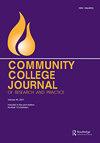“Setting Down Roots”—Developing Formerly Incarcerated Student Programs Through Advocacy and Network Building
IF 0.6
Q3 EDUCATION & EDUCATIONAL RESEARCH
Community College Journal of Research and Practice
Pub Date : 2023-09-12
DOI:10.1080/10668926.2023.2256256
引用次数: 0
Abstract
This study examines formerly incarcerated student programming from practitioner perspectives at California community colleges. The following research questions guide the study: 1) How has the pandemic and concurrent sociopolitical contexts influence the way staff, faculty, and administrators approach their work? 2) How do practitioners describe their experiences supporting formerly incarcerated students? 3) How are challenges and opportunities toward sustaining their programs described? I used a basic qualitative approach to collect interview data with 15 staff, faculty, and administrators. Once data were transcribed, I engaged in open and axial coding to capture participants’ words, which developed into categories and emergent themes. Faculty and staff expressed profound care for students and their programs and acted on this care by challenging deficit-perspectives and advocating for students’ needs. Despite many programs’ funding concerns, participants shared how they gain support for currently and formerly incarcerated students by developing webs of support toward a more inclusive campus environment. Findings reveal how practitioners respond to and meet students’ personal and academic needs by allocating and sharing relevant resources like housing support and advising services. Staff often assume a case management role for students and advocate for their programs’ needs such as funding and physical meeting spaces. Findings affirm the need for colleges to expand their support for formerly incarcerated students and develop intentional spaces toward empowerment and desistance.“扎根”-通过倡导和网络建设发展前监禁学生项目
本研究从加州社区学院从业者的角度考察了曾经被监禁的学生的编程。以下研究问题指导研究:1)大流行和同时发生的社会政治背景如何影响员工、教师和管理人员的工作方式?2)从业人员如何描述他们支持有前科的学生的经历?3)如何描述维持项目的挑战和机遇?我使用了一种基本的定性方法来收集15名教职员工和管理人员的访谈数据。一旦数据被转录,我就会进行开放编码和轴向编码来捕捉参与者的话语,这些话语发展成类别和突现主题。教职员工表达了对学生和他们的项目的深切关怀,并通过挑战赤字观点和倡导学生需求来采取行动。尽管许多项目存在资金问题,但参与者分享了他们如何通过建立支持网络,为目前和以前被监禁的学生提供支持,以建立一个更具包容性的校园环境。调查结果揭示了从业人员如何通过分配和分享相关资源(如住房支持和咨询服务)来应对和满足学生的个人和学业需求。工作人员通常承担学生的案例管理角色,并倡导他们的项目需求,如资金和物理会议空间。调查结果证实,大学需要扩大对曾经被监禁的学生的支持,并有意识地发展赋予权力和抵制的空间。
本文章由计算机程序翻译,如有差异,请以英文原文为准。
求助全文
约1分钟内获得全文
求助全文
来源期刊

Community College Journal of Research and Practice
EDUCATION & EDUCATIONAL RESEARCH-
CiteScore
2.20
自引率
20.00%
发文量
59
 求助内容:
求助内容: 应助结果提醒方式:
应助结果提醒方式:


